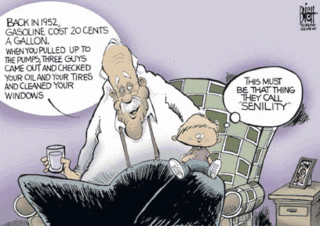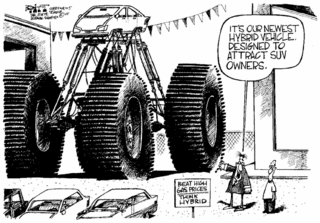








a journey of preparation

I spent this past weekend on the road. I drove to Philadelphia, PA to pick up my new form of transportation, a 1988 BMW K100 motorcycle purchased online. I couldn’t help but realize that the money saved by shopping at the national flea market that is eBay will soon disappear as shipping costs increase along with fuel prices. I was happy though to stretch my legs and see some of the country and anxious to secure my new vehicle. I have relied on a motorcycle as a means of transportation before, but that was in college where the ability to park next to the front door when running late for class was more important than the increase in fuel efficiency. This time the purchase was planned in order to decrease my personal dependence on big oil companies and overseas supplies. On my drive northward I couldn’t help but think that I see more and more alternatives to the standard 4-wheeled automobile cruising the roads these days.
I thought about my good friend Jared Paulsen. As a wedding present this past May, he received an electric scooter his wife had been excited about for some time. At first, the scooter was relegated to play toy. But being from Nebraska, Jared quickly began tinkering and added enough additional battery power to make round trips to his place of employment. The flat topography of his new costal hometown, Mt Pleasant, SC and his close proximity to work, grocery stores and pubs made his new form of transportation quite practical. Jared and his brother Mat run a kayak touring company called Barefoot Island Sports. They have now added an additional component to their business and have become the local representatives of a website that sells similar forms of 2-wheeled transportation. To date they’ve sold 5 scooters using only word-of-mouth advertising.

I find another example in my good friend Keith Cummings. Keith is a medical student at Duke University and an interesting mix of intelligence, stubbornness and spirituality who will make an excellent doctor if not a wonderful shaman someday. Recent discussions concerning resource depletion show Keith strongly aligned with the technophile group who think human ingenuity spurred to action by the invisible hand of the market will step in with a sword to save us from the beast of supply exhaustion at the very last moment. He is however a very smart guy and I was not surprised to learn that he too has recently acquired an alternative form of transportation of the 2-wheeled variety. He describes his new bike thus:
Displacement - 49cc
Vmax - 42mph (43 downhill)
Efficiency - 87 mpg
Fun Level - 6.5
Off the line - 3-toed-sloth-esque.
Chickmagnitude - 3.1
I couldn’t help but think that the trend is here, that those with the vision to understand the greater context of fuel resources and our coming energy crisis have already begun to react. They are investing in unconventional transportation as the convention itself is distorted by decreasing fuel supplies. Perhaps “The Long Emergency” is already here and we have begun to take steps to transition into a world where energy is not cheap and plentiful. Or maybe bikes are just more fun.
I have postponed this first posting as I haven't known exactly where to start. I've decided not to let that fact deter me any longer.
When I was ten years old I first asked myself a question who's answer now seems so obvious. The answer however came with its own set of dreadful recognitions. The question arose from a reading of the book "Watership Down". To put it simply, I began to wonder why humans had so dramatically increased their numbers and their influence over this planet in such a short time. Humans had been kicking around this ball of rock for 10,000 years and just suddenly, in one century jumped from a little over 1 billion in population to just a tad over 6 billion? Surely pure numbers alone can not explain this explosion?
At first of course the question was crudely formed in my young mind but it stuck with me and refined itself over time. I continued to read and studied land planning at University. With this education came an explanation of past civilizations and their organizations. Lacking was any focus on the ones that had collapsed or more specifically why they had collapsed. We are all familiar with the fall of Rome. But I never studied the Norse, the Anastasias, the people of Easter Island or the others. The focus was always on past progress and how our civilization in its current form had come to be. For sure the arithmetic of steady growth played a part, described quite eloquently by Dr. Albert Bartlett, but I began to piece together other bits of information that pointed to the massive role that petroleum played in the rise of this our civilization. Never before had man been able to harness such an incredibly energy source like the one first drilled for by Mr. Edwin L. Drake in Pennsylvania in 1859.
With this new energy source available the number of farmers in the United States of America decreased. In 1890 the census showed a little more than 40% of the population was farming for a living. That number had dropped to less than 2% by 1990 and don’t forget the increase in population to feed. Tractors and pumps power by oil and fertilizers and pesticides created from oil meant fewer humans were needed to produce the food. That left quite a few individuals to think up things like internal combustion engines and such. This is but a single example among many of the pieces of information that began to answer the question that had so long vexed me.
Oil is the cheap, easily recoverable, highly transportable, energy-dense fuel on which the current boom of human population and this age of technology are based. But with my epiphany came a horrible realization. This finite resource is about to reach the peak of its production. This means that for the first time since its discovery, there will be less oil available than oil demanded- for physical reasons, not political ones. Our society will follow oil production in a downward trend and slowly implode or even possibly burst and suddenly crash. In less than 100 years we will live again (with some exceptions) as we did in 1901. Fasten your seatbelts; the ride will be very bumpy.
This will be my place to come and vent my thoughts and feelings, ideas and anxieties concerning this historic shift in the direction of the path of human beings of this our planet Earth and the aforementioned bumps. Feel free to join in.

Graph: The Energy Curve of History?
Source: Community Solution